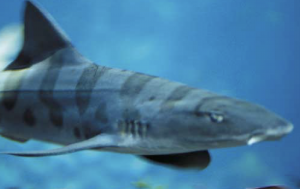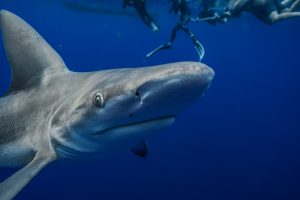Tiger sharks will never be in danger of depletion, nor worse, under current fishing methods worldwide. They mature very quick as far as sharks go, and the females are always much larger than the males, and probably mate with several males like many shark species during breeding season that helps genetic diversity, and have scores of pups each pregnancy, and frequently every few years, plus the pups are eating machines upon birth. They can dive very deep in the ocean as seen on film from ROV’s, plus hang out near the inshore reefs/beaches & are known in the early literature of the 20th century as “bank loafers” and love eating sea turtles of all sizes, and marine mammals of many sorts, plus sea birds. A keg of nails, a roll of tar paper and humans not normally consumed, but were found in some Tiger shark stomachs across history. Off Florida in the 1980’s one of the shark fishing boats from my back yard caught a big Tiger and it had a pair of feet still in the shoes from a police officer as we later learned who was fishing offshore with 3 other policemen in a private boat, and they all disappeared.
The facts of science are ignored as needed to send the emotional concern of “Extinction” to the heart and/or brains of those folks targeted by the “do-gooder type folks” in my humble opinion with an obvious agenda of protecting all animals from all humans. Some folks like myself dig deeper and can get past the sound bites/bytes of misinformation campaign with the NGO preservationists entrenched around the world for quite a while now. I am trying to stick to the facts as much as I can convey publicly the realty of the past, present and perhaps even the future.
Rusty
Russell Howard Hudson, President Directed Sustainable Fisheries, Inc. (DSF) PO Box 9351
Daytona Beach, Florida 32120-9351




